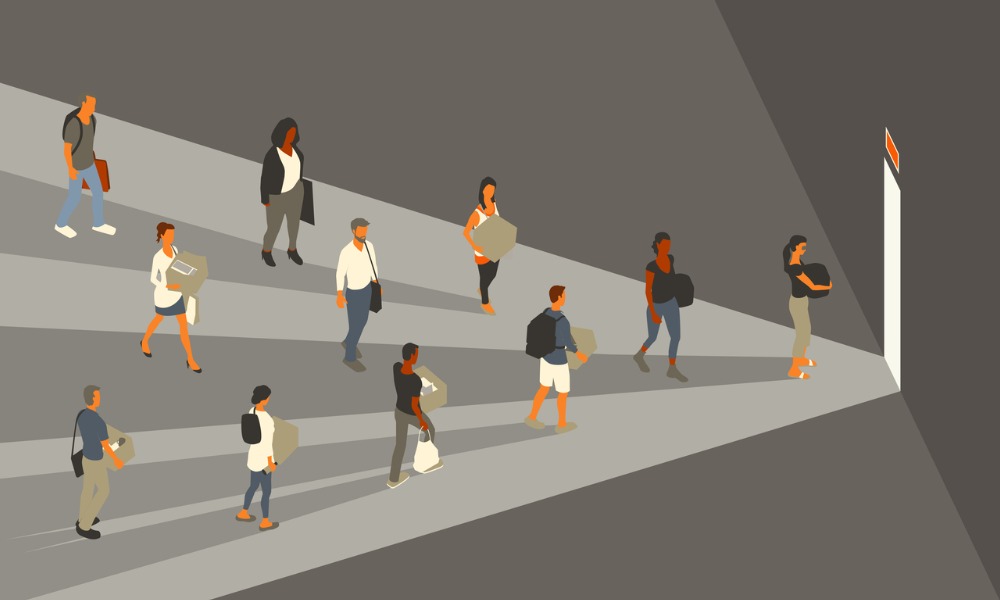Office culture could be about to change forever as employers experiment with increasingly sophisticated tech
Personal data collection has long been used to boost productivity but could tiny microphones – embedded in each employee’s own lanyard – be about to change the face of office culture forever?
A Deloitte team in Newfoundland adopted the pilot project last winter during office renovations - CBC News recently reported on its impact. According to one in-house HR expert, it’s been a huge success.
"The minute that you get the report that you're not speaking enough and that you don't show leadership, immediately, the next day, you change your behaviour," Silvia Gonzalez-Zamora told CBC News.
"It's powerful to see how people want to display better behaviours or the behaviours that you're moving them towards,” added the analytics leader.
The concept isn’t as Orwellian as you might think – while the microphones pick up tone of voice and frequency of contributions during meetings, they don’t record specific conversations.
Similarly, accelerometers measure body language and track how often an employee pushes away from their desk – but don’t count coffee breaks or trips to the toilet.
All the data collected is done so anonymously and each employee is assigned their own confidential ID – this way they can compare their own behaviour against that of other participants without fear of reprisal.
CEO Ben Waber heads up Humanyze – the company behind the lanyards – he says the trackers offer real, valuable data on what makes workers happy and productive.
"To be able to show you — here's what the people who get promoted do … here's what the top performers do, here's what the happiest people do — and show that change over time and how your behaviour is changing over time" is very powerful, Waber told CBC News.
For Deloitte, the trackers revealed workers preferred the new layout and were less likely to take breaks as a result.
In a similar case study for the Bank of America, Humanyze tracked employees at a call centre for three months – in the end, the team suggested employees take breaks at the same time.
After the change was introduced, productivity increased by as much as 20 per cent while stress levels dipped by 19 per cent, according to Humanyze’s measurements.
A Deloitte team in Newfoundland adopted the pilot project last winter during office renovations - CBC News recently reported on its impact. According to one in-house HR expert, it’s been a huge success.
"The minute that you get the report that you're not speaking enough and that you don't show leadership, immediately, the next day, you change your behaviour," Silvia Gonzalez-Zamora told CBC News.
"It's powerful to see how people want to display better behaviours or the behaviours that you're moving them towards,” added the analytics leader.
The concept isn’t as Orwellian as you might think – while the microphones pick up tone of voice and frequency of contributions during meetings, they don’t record specific conversations.
Similarly, accelerometers measure body language and track how often an employee pushes away from their desk – but don’t count coffee breaks or trips to the toilet.
All the data collected is done so anonymously and each employee is assigned their own confidential ID – this way they can compare their own behaviour against that of other participants without fear of reprisal.
CEO Ben Waber heads up Humanyze – the company behind the lanyards – he says the trackers offer real, valuable data on what makes workers happy and productive.
"To be able to show you — here's what the people who get promoted do … here's what the top performers do, here's what the happiest people do — and show that change over time and how your behaviour is changing over time" is very powerful, Waber told CBC News.
For Deloitte, the trackers revealed workers preferred the new layout and were less likely to take breaks as a result.
In a similar case study for the Bank of America, Humanyze tracked employees at a call centre for three months – in the end, the team suggested employees take breaks at the same time.
After the change was introduced, productivity increased by as much as 20 per cent while stress levels dipped by 19 per cent, according to Humanyze’s measurements.





